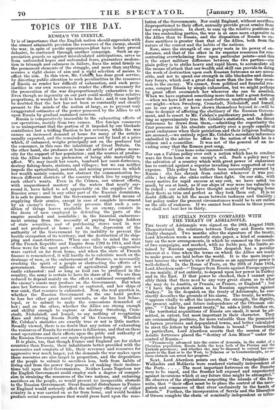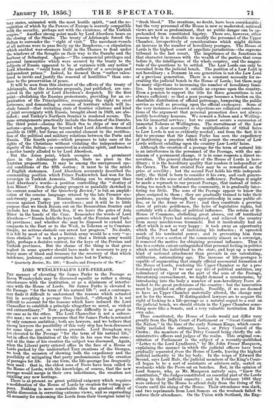THE AUSTRIAN POINTS COMPARED WITH THE TREATY OF ADRIANOPLE.
THE treaty of Adrianople was signed on the 28th August 1829. Thenceforward the relations between Turkey and Russia. were vitally changed. Two months after the signature of the treaty-, Lord Aberdeen wrote a masterly state paper, a kind of commen- tary on the new arrangements, in which he summed up the results of two campaigns and marked, with no feeble pen, the limits at- tained by Russian aggression. This despatch has a peculiar interest at a time when the terms on which the Allies are ready to make peace are laid before the world. It is the more impor- tant because the writer's view of Russia as an aggressive power is well-defined. In the House of Peers, on the 26th of June 1854, Lord Aberdeen said—" Danger from Russia against Europe appears to me mainly, if not entirely, to depend upon her power in Turkey and in the East. If that power be checked, then I cannot pos- sibly think that there need be any very great alarm as to what she may do to Austria, or Prussia, or France, or England"; but " I have the greatest alarm as to Russian aggression against Turkey." In the despatch on the treaty of Adrianople, he suc- cinctly describes the grounds of his alarm. The treaty, he writes, "appears vitally to affect the interests, the strength, the dignity, the present safety, and future independence of the Ottoman em- pire." " Under the present treaty," he adds a little further on, " the territorial acquisitions of Russia are small, it must be ad- mitted, in extent, but most important in their character. They are commanding positions, far more valuable than the possession of barren provinces and depopulated towns, and better calculated to rivet the fetters by which the Sultan. is bound." Descending to particulars, Lord Aberdeen asserts that the cession of the Asiatic fortresses placed the " destiny of Asia Minor" under the control of Russia- " Prominently advanced into the centre of Armenia, in the midst of a Christian population, Russia holds the keys both of the Persian and the Turkish provinces; and whether she may be disposed to extend her con- quests to the East or to the West, to Teheran or to Constantinople, no se- nous obstacle can arrest her progress."
Next, Lord Aberdeen points out that "the Principalities of Wallachia and Moldavia were rendered virtually independent of
the Porte The most important fortresses on the Danube were to be razed, and the frontier left exposed and unprotected-
.a.inst incursions which at any future time might be attempted." He observes of the stipulations respecting the islands of the Da- nube, that " their effect must be to place the control of the navi- gation and commerce of that river exclusively in the hands of Russia." Further, the incorporation of Servia and the liberation of Greece complete the chain of nominally independent or tribu- buy states, animate& with the most hostile spirit, " anclthe re- cognition of which by the Powers of Europe is scarcely com.patible with the security, perhaps not with the existence, of the Turkish empire." Another strong point made by Lord_ Aberdeen. bears on the closing of the Straits. The treaty of Adrianople forced. the Sultan to surrender the " right of visit."' The merchant-vessels of all nations were to pass freely up the Bosphorus,—a stipulation which enabled war-steamers built in the Thames to float under the windows of the Seraglio on their way to the Danube• and the
harbour of SebastopoL —" The commercial privileges and personal immunities whie were secured by the treaty to. the subjects of Russia appeared: to be at variance with any notion"' Lord Aberdeen 'could form of the authority of a sovereign and independent prince." Indeed, he deemed them "rather calcu- lated to invite and justify the renewal of hostilities"' than con- duce to the preservation of peace. It will be seen from this abstract of the effects of the treaty of Adrianople, that the Austrian proposals, just published, are con- ceived in the spirit of Lord Aberdeen's despatch. By the first point—abolishing the Russian protectorate, providing for an or- ganization of the- Principalities, recognizing the right to erect fortresses, and demanding a cession of territory which will in- clude Ismail—that irritating state of frontier relations and kind of joint sovereignty with Russia, brought about in 1829, are abo- lished ; and Turkey's Northern 'frontier is rendered secure. The same arrangements practically include the freedom of the Danube. The third point—closing the Black Sea to ships of war of all nations-lees, perhaps, far beyond what Lord Aberdeen dreamed possible in 1829 ; but forms an essential element in the rectifica- tion of the political and military relations between the Porte and Russia. The fourth point—which proposes to take care of the rights of the Christians without violating the independence or dignity a the Sultan—is conceived in a similsr. spirit, and touches a matter barely alluded to by Lord Aberdeen.
But. the Asian point, which occupies such a prominent place in the Adrianople despatch, finds no place in the Austrian propositions. It may be among the unexpressed spe- cial conditions of the fifth section ; it must be in the minds of English statesmen. Lord Aberdeen accurately described the
commanding position which Prince Paskiewitch won for his sovereign in Turkish. Armenia. Nothing can be stronger than Lord Aberdeen's words—a position controlling the " destiny of Asia Minor." Even the gloomy prospect so painfully sketched. in. the current number of the Quarterly Review,* is but an amplifi- cation of the concise language uttered by the late Premier six- and-twenty. years ago. Russian success in Asia is Russia= success against Turkey par excellence ; and it will be to little purpose that we block Russia out on the Bessarabian frontier and exclude her from the Black Sea, if we leave the gates of Asia Minor in the hands of the Czar. Remember the words of Lord Aberdeen--" Russia holds the keys both of the Persian and Turk- ish provinces ; and whether she may be disposed to extend her conquests to the East or to the West, to Teheran or to Constan- tinople, no serious obstacle can arrest her progress." No doubt, it is felt by most of us that a British army would be a very " se- rious obstacle" to such a progress ; that a British army would. fight, perhaps a decisive contest, for the keys of the Persian and Turkish provinces. But the shame of the thing is that gross neglect in some quarter should have made it necessary to pay a heavy score of blood and treasure for the recovery of that which indolence, jealousy, and corruption have lost to Turkey.
* Quarterly Review, No. 195 ; "Results and Prospects of the War."































 Previous page
Previous page